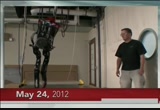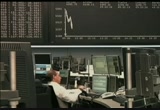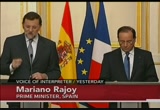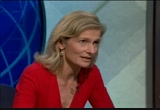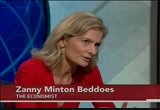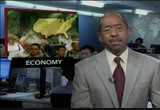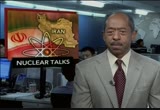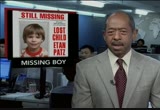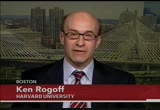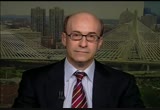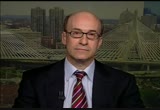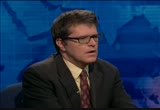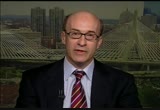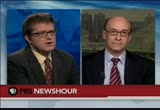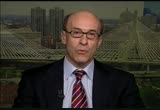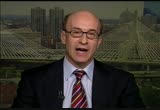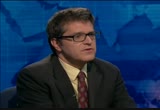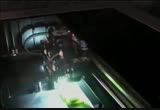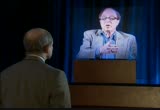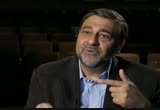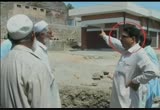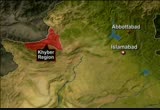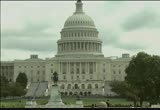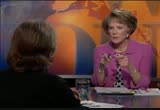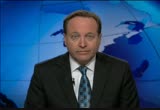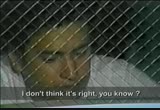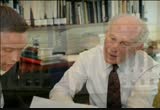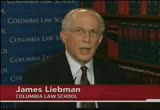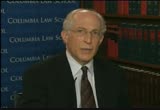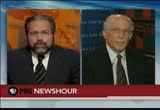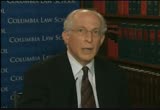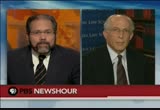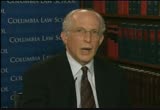tv PBS News Hour PBS May 24, 2012 6:00pm-7:00pm EDT
6:00 pm
captioning sponsored by macneil/lehrer productions >> brown: europe's economic woes worsened today, causing renewed fears amid political disarray. good evening, i'm jeffrey brown. >> woodruff: and i'm judy woodruff. on the "newshour" tonight, we get the latest on the crisis as european leaders ended their summit without agreement on concrete solutions. >> brown: plus, we ask how europe's instability could affect the u.s. especially as it deals with its own fiscal crisis. >> woodruff: then, paul solman asks an age-old question: will new technology make human workers obsolete? >> there are factorys where robots do almost all of the work. >> and lights out? why is it called lights out?
6:01 pm
>> because you don't need lighting in a place run by robots. >> brown: margaret warner looks at the case against the pakistani doctor jailed for 33 years after helping the c.i.a. capture osama bin laden. >> woodruff: and ray suarez has the story of a columbia university professor's fight to prove an innocent man was executed in texas. >> there was not a sled of forensic in evidence this case, even though the crime scene was a very small confined area that was just doused in blood, there was not even a microscopic drop of blood on carlos deluna or his clothing. >> brown: that's all ahead on tonight's "newshour." major funding for the pbs newshour has been provided by: >> and by the bill and melinda gates foundation. dedicated to the idea that all people deserve the chance to live a healthy productive life. and with the ongoing support of
6:02 pm
these institutions and foundations. and... this program was made possible by the corporation for public broadcasting. and by contributions to your pbs station from viewers like you. thank you. >> brown: there was no clear way forward today for european leaders, as economic problems reached new crisis points. the continent's debt burden has now been joined by looming recession and deepening political divisions. new data showed a worsening economic contraction throughout europe today. the gloomy news came the morning after an inconclusive meeting of european leaders in brussels. the summit reinforced the divisions between the two top euro-zone economies, france and germany. a main issue: how to balance
6:03 pm
germany's push for budget austerity, with the new french government's emphasis on economic growth. >> for the german government austerity is not everything. >> brown: in fact, guido westerwelle, the german foreign minister, acknowledged today a need for a balanced approach, including growth policies. he echoed comments reportedly made behind closed doors in berlin by chancellor angela merkel. but westerwelle said one proposal to ease the crisis -- by issuing so-called euro-bonds to lower interest rates in debt- laden nations-- would make matters worse. >> we think that we cannot solve a debt crisis by making it easier to take up new debts. and if we allow to make it easier to take up new debts we do not solve the crisis. from our point of view we increase the difficulties and the problems we have.
6:04 pm
>> brown: left unsaid: euro- bonds would mean higher interest rates in germany, which has benefited greatly from its lower borrowing costs. but francois hollande-- the new president of france, in office just ten days-- has promoted the euro-bond idea. he again stressed the need for growth as he headed into last night's meeting in brussels. >> we must work based on economic challenges. how to bring growth back? on financial challenges, how to bring back liquidity? but also on the political challenges: what do we want to do together in europe, what kind of project do we have? >> brown: hollande was joined by spanish prime minister mariano rajoy. his nation is imperiled by its enormous debt, but it's largely the byproduct of a burst housing bubble, not public overspending as in some other euro-zone nations. >> for spain the most urgent thing is that we need financing, we need liquidity and we need sustainability for the debt.
6:05 pm
there are many countries which are making enormous efforts in order to control their public deficits and the structural reforms. >> brown: and, as elsewhere, there is increasing public pushback in spain with unemployment at a crushing 25%. miners went on strike today, and protesters gathered outside the parliament to denounce labor reform. >> ( translated ): this will put an end to all the workers rights that have been fought for 30 years. it leaves us workers sold out under the power of businessmen. >> brown: but the businessmen are not immune either. this shop owner is shutting down after 40 years and liquidating his stocks of fabric and carpeting. >> ( translated ): since 2009 it has been a torture. we have got to a point when this is impossible. not only we do not have any profits, but we just can't keep our activity guaranteeing the salaries of our staff. >> brown: it was announced yesterday that spanish banks--
6:06 pm
badly-damaged by the housing bubble-- will undergo an extensive audit to ensure that they can survive. banks in greece saw a modified run on their holdings earlier this week, as their fate in the euro-zone was openly debated in brussels, and on the streets of athens. a once-unthinkable return to the traditional drachma currency was on many athenians' minds. >> i prefer euro to drachma. >> the euro is for merkel, not for greeks. >> brown: whether the greeks stay with the euro may rest on the outcome of elections next month. they were mandated after voting this month failed to produce a government. here with me is zanny minton beddoes, the economics editor for the "economist" magazine. zanny, rather suddenly the seems to be a lot of anxiety, even fear. am i right? >> you're absolutely right. unfortunately the sense of crisis is back and i would even say the sense this whole euro project could fracture is back. >> brown: that serious? >> yeah, it's this serious. the end of last year, the end of
6:07 pm
2011 we had a similar moment of real fear in global financial markets. then the european central bank came in and basically poured a trillion euros worth of liquidity into european banks and that calmed things in the beginning of this year for a couple months. it led the europeans to crow, in fact, that they sold their crisis but at that point it was an anesthetic but the underlying disease is still there and it's come back with a vengeance. >> brown: but it came back almost through a political route right? we had these elections and it looks like political disarray as much as economic problems. >> political and economic. i think there are three reasons why this real sense of crisis has come back. the first is it's political and it's greece. the greek voters basically... in their elections voted overwhelmingly for parties that wanted to renegotiate or whip up or not continue with the austerity package. they couldn't form a government, now they're having another election on june 17 and that's basically turned into what's
6:08 pm
going to be a referendum in effect on whether they want to stay in the euro or not. so from there that there's a fear one of the 17 countries may leave or pushed out, really... considering others it's at the the beginning which goes then? portugal or spain? so that's reason number one. reason number two is that on the economic side the recipe doesn't seem to be working. if you look at the spanish economy you have huge unemployment, 50% youth unemployment, a huge deficit and the debt problems are getting worse and there's a growing concern that the current recipe isn't working and the disarray about what to do. >> let me stop you on reason number two because it sounds like two sides have formed, germany which we've heard for a long time. now a representative from france with the new president saying wait a minute, there's another route. we just heard in the taped piece a suggestion of a... maybe of a middle or balanced approach to german foreign minister. is there any... are the two sides hardened here? or is there a sense there's some way out? >> it depends what time frame
6:09 pm
you're talking about. in the short term there is some room for the two sides to come together. the to caricature this just a bit, the germans think austerity budget cutting is the essential thing and the other side thinks growth is important. and i think germans are willing to say "we'll have measures to boost growth alongside austerity." so i think you'll see some short-term measures, an increase in the capital of the european investment bank, modest tinkerings to say we'll is v growth and austerity but there's an area of euro bonds and the whole area of to what extent to you need to take a big step to create some kind of mutual fiscal. >> brown: which was on the table at least a while ago, which was set aside in the last year or so but you're saying is back. >> i think it's back but a lot of people have realized in the medium term the euro's future depends on having some greater movement toward some more fiscal union. they need if you will a hamilton moment.
6:10 pm
they need to have someone mutual debt issued firstly to give market confident that they're really determined to stick with this project, secondly to allow indebted governments-- the italys of this world-- some means of access to cheaper money. and thirdly to provide european banks with a safe asset which is a euro-wide asset. >> brown: i think i stoped you reason number three? reason number one was greece and reason to two is the economy and the band-aid. >> reason number three is politics and i think the growing sense that european voters are fed up and that european voters are voting are streeting for more extreme parties, against the establishment. this isn't just happening in greece. even angela merkel for slightly different reasons lost in two important state elections in the last few weeks. so there's a sense in a region whose economy are shrinking where the economic outlook is looking darker, the patience with this current route is running out. >> brown: and all this means this thing we talked about and
6:11 pm
everybody said couldever happen-- a member leaving the euro-- i see people spinning out how it might happen and when. >> and the risk is those kinds of things become self-fulfilling. if enough people can say it will happen, it will happen. >> brown: then the question as you raised before, what impact, right? domino effect that might happen, which is unknown. >> and i think to hold the rest of the currency together if greece does leave the others, the 16 that remain, will have to take a quantum leap towards greater integration and much faster than the germans seem prepared to want to do. >> pelley: zanny minton beddoes of "the economist," thanks so much. >> thank you. >> woodruff: coming up, we turn from europe to fiscal challenges here in the u.s. also ahead, human workers versus machines; the pakistani doctor who aided the c.i.a. and the execution of an apparently innocent man. but first, the other news of the day. here's kwame holman. >> holman: the u.s. economy gave off more mixed signals today. first-time claims for unemployment benefits dipped slightly last week, and durable goods orders increased a bit in april.
6:12 pm
but a key measure of business investment spending fell for a second straight month. the lack of clear-cut trends led to another choppy session on wall street. the dow jones industrial average gained 33 points to close above 12,529. the nasdaq fell more than ten points to close at 2,839. egyptians flocked to the polls for a second day of voting in their first, freely contested presidential election. among the main contenders are mohammed morsi of the muslim brotherhood and ahmed shafiq, the last prime minister under former president hosni mubarak. results are expected on may 29. it's widely anticipated a run- off will be needed next month. iran's nuclear negotiations with the u.s. and five other countries ended in baghdad today with no breakthrough. the iranians insisted they have a right to enrich uranium. they complained world powers want to maintain tough economic sanctions, until iran gives up its nuclear ambitions. on the other side, catherine ashton, the e.u. foreign policy
6:13 pm
chief, had this take on the two days of talks. >> it's clear that we both want to make progress and that there is some common ground. however, significant differences remain. nonetheless, we do agree on the need for further discussion to expand the common ground. we will go back to respective capitals and consult. >> holman: in washington, secretary of state hillary clinton said the six-nation bloc will try to narrow its differences with iran in the next round of talks next month, in moscow. syrian government forces and the rebels fighting them have committed serious human rights abuses during the 14-month uprising. a u.n. investigation reached that conclusion today. it found government troops have killed entire families, while opposition forces kidnapped and tortured prisoners. the violence has continued despite u.n. attempts to broker a cease-fire. a 33-year-old murder mystery in new york city now has led to an
6:14 pm
arrest. the victim was six-year-old etan patz, who disappeared on his way to school in 1979. his case sparked the national drive to put the pictures of missing children on milk cartons. today, new york mayor michael bloomberg confirmed a suspect was picked up last night, in new jersey. >> we have a suspect in custody who has made a statement to the n.y.p.d. implicating himself in the disappearance of etan petz 33 years ago. let me however caution you that there is still a lot more investigating to do. the process will continue we do things methodically, carefully and we'll see what develops. >> holman: the suspect was identified as pedro hernandez. police officials say he told investigators he suffocated the boy, wrapped his body in a bag, and put it in a box. hernandez was being questioned further today. those are some of the day's major stories. now, back to judy.
6:15 pm
>> woodruff: and we pick up on europe's economic crisis to look at the risks it poses here in the u.s., at a time when this country faces its own huge fiscal problem. how to bring down the united states' rising debt is a topic of growing debate as we head to an election at the end of this year. that's when the bush-era tax cuts are scheduled to expire and a scheduled round of spending cuts are set to take effect. this week the congressional budget office warned if that was all this is allowed to take place, the economy would be knocked back into recession for the first half of next year. more on this now from two men who watch the u.s. economy closely: ken rogoff of harvard university and josh bivens of the economic policy institute. welcome to both of you. and ken rogoff, to you first, what is the european scenario that the united states should be most worried about? >> oh, goodness. i mean, there's really a cliff
6:16 pm
there. there's a possibility the whole euro can dissolve if they don't take a quantum leap towards unification and we could have a layman moment again. it's not... lehman moment again. it's not hyperbole to say that. they've seen that in europe. they can't agree among themselves what is are they going to do when greece leaves which is the equivalent of lehman going under in the united states. >> and josh bivens, even short of the worst-case scenario, the u.s. is already feeling the effects of what's happening in europe. >> i think that's right. i think slow grooet in europe and now it looks like outright contraction in a lot of europe is meaning we export less. i would say over the last year, over the coming year if they're in a recession, we're probably talking about less than half a percentage point of g.d.p. knocked off our growth rate because of european troubles but given the growth rate is slow already, those are precious little percentage points that we can't afford to give up so we have already felt some effects.
6:17 pm
>> warner: meantime, the congressional budget office is this week saying the u.s. is on the edge of a fiscal cliff. just how bad is the debt problem in the united states? >> well, the two things weighing on businesses and why they're not investing as much as they should and why they're not hiring as much as they should are europe and the fiscal cliff. they don't know what direction the u.s. economy is going. there is potentially a huge contraction in the u.s. with, as you said, the bush era tax cuts expiring, payroll tax cuts expiring and some other changes that would put us into recession. i don't think that's going to happen but what has everybody nervous is what are they going to do? are we going to have tax hikes? are we going to have government spending cuts? there seems to be no direction, no agreement in washington on what direction to go and there's this huge cloud of uncertainty here compounding what we're seeing in europe.
6:18 pm
>> warner: just staying with you ken rogoff, what does that mean for the u.s. considering, as you're pointing out, the economic recovery still is very weak. what are the real options for policymakers? >> well, we could dream that they would do something like the simpson-bowles proposal where they're going to keep rates low, make reforms to social security. we have many things we can do so that we can grow our way out of this deep recession that we've been in so that we can get on a good stronger growth path in the future but there's paralysis in washington. i don't think it's hyperbole to say that. with two very different come peting visions of where things should go and businesses in the consumer stuck in the middle. >> warner: josh bivens, two very different visions of what should happen. but just to back up for a minute how do you see the depth of the
6:19 pm
debt crisis or debt problem facing the united states? >> i think we should be clear. when people talk about the fiscal cliff coming in 2013, it's not a crisis of too much debt, it's a crisis of ramping down debt too quickly. i think people need to realize that. the problem with the tax cuts expiring, the unemployment extensions expire, spending power will be sucked out of the economy that's been supported by expansions of debt. in the short term it's a good thing and it's a cautionary tale that yes we can be concerned about debt projections for 20, 30, 40 years from flow but we shouldn't let us blind us to the fact that the right thing to do here and now is to spend more money, financed by debt, in order to bring the unemployment rate down quickly. that's the real thing we should be focused on. >> woodruff: timogoff, how do you see about the danger of pushing that debt down too fast? >> well, i agree with josh that we don't want to push it down too fast but i don't agree we're talking about 30 to 40 years. our debt level is very high by
6:20 pm
historical standards. it's likely to weigh on growth in the united states for decades that our debt is so high already. you don't just want to wildly have it go up but yes, we are still a recession, unemployment is high, we can't afford to unwind this quickly but i think the key to doing this well is to try to have some real reform, some vision in washington when we can both get our debt on a bet traer jektory and not try to do things too quickly in terms of trying to balance the budget right now. >> warner: josh bivens, we could get into a lot of detail here but help us understand why you see the debt situation differently, a little differently from how ken rogoff sees it? >> i think there's a couple reasons. one is, you know, i just weigh the short-term unemployment crisis heavily and i'm calling it short term and that's misleading. it might become... it's already been three or four years since the unemployment crisis and it might linger for a decade to
6:21 pm
come if it's not address. there is a time when we should worry about deficits being too large and that's when the economy is healthy and running at full employment is healthy again because deficits run when the economy is depressed just don't hurt you. we're often told the optimal policy is stimulus now, long run deficit reduction and discipline later and that's right and we did that over the past couple years. we passed the recovery act in 2009 and we passed health care reform which is a mammoth deficit reducer in the long run yet somehow people don't want to give credit for that. in fact the c.b.o. in their alternative fiscal scenario basically said "we're not even going to assume that that holds in the long run." so an easy thing to say short term stimulus long-term deficit reduction, it's hard to make it stick and we shouldn't make that the enemy of fighting unemployment in the here and now. >> woodruff: ken rogoff, what about that point? >> i just don't agree the deficits aren't a problem now. i agree not to bring them down too fast, that's for sure. but to think there's not a long run secular problem here given
6:22 pm
how high our debt is, where things are going, we could be looking at having a level of income 25% lower than it would be otherwise a couple decades from now. this isn't just a couple percent this isn't like we pushed the problem out into the future. it's a big problem but that said obviously we're running a really big deficit now, things are still very difficult. we can't move quickly on this. it would be too painful. i wouldn't sty go in the other direction. don't jump off the fiscal cliff, on the other hand we could potentially have a much bigger cliff coming down the road if we don't start doing something sooner rather than later. >> warner: ken rogoff you have worries about this continuing debt and what it means for raising borrowing costs down the road. >> perhaps raising borrowing costs eventually if people panic. a country like the united states people have confidence we will do something and won't go the
6:23 pm
way of greece but if you look over his think there's many, many advanced nations that have gotten in this situation, they raised taxes, they don't default or do something crazy but it slows growth so you're comparing an urgent problem indeed but with a long-term secular problem you have to balance these things. i think we'd have a reasonable balance at the moment if we don't jump off the fiscal cliff but we don't have a sensible tax system, we don't have a good growth strategy. we're missing a lot of things. i would concentrate on. that i don't think it's just a matter of there's too much austerity. we're running at 8% deficit right now. >> warner: josh bivens, what's your take on that? >> a couple things. we seif far largely resisted austerity at the federal level in the united states. that's paid off for us. compare us to say the u.k., an economy that had a very similar recession and recovery until the middle of 2010 when they embraced austerity and elected an a conservative government. since then they've stagnated, entered recession, we have
6:24 pm
continued to grow. i would say state and local level we have not resisted austerity at all. it's been a big sap on growth and that's been a drag we should be cognizant of. and if you think the health reform as enacted will be followed to the letter of the law, we have done mammoth deficit reduction in the last couple years that poem don't want to believe. we should do other stuff, too. i would love beater tax code that was fairer and collected more revenue. we should attack health care costs growing too fast but here and now the real problem is unemployment and getting it down quickly. >> warner: we are going to continue to watch this closely. josh bivens, ken rogoff, thank you very much. >> thank you. >> brown: now, the challenges of creating enough new jobs in an ever more automated and high-tech economy. "newshour" economics correspondent paul solman has the story, part of his ongoing reporting: "making sense of financial news."
6:25 pm
>> american labor, management and capital. >> reporter: our favorite economics cartoon is a piece of free market propaganda from decades ago that envisioned a sort of cornucopia machine of the future, manned by the happy and lucky american worker, given the name king joe. >> hi, folks! >> joe's the king because he can buy more with his wages than any other worker on the globe. >> reporter: or at least, back in the mid 20th century he could. today, our "newshour" inclusive statistic of all un- and underemployed, totals more than 26 million americans, nearly 17% of the workforce. how many of them worked at jobs that machines now perform more cheaply? how many so-called knowledge workers are threatened by the likes of i.b.m.s jeopardy champ, watson. >> i've been waiting for this moment for a very long time. >> reporter: who may soon echo
6:26 pm
the old song "i can do anything better than you." >> watson? >> what is jericho? >> correct! >> this mystery author and her archeologist hubby. watson? >> who is agatha christie? >> correct! >> reporter: we've been showcasing the future of technology from a recent conference run by a california think tank called singularity university: 3-d printing of everything from prosthetic legs to organs; iphone heart tests; new forms of life-- organic and not-so-much. the conference raised an age-old question with new urgency: is the fear of machines making most humans obsolete a reality at last? >> it's just going and it's going. it's so scary. >> reporter: will.i.am, lead singer of the black eyed peas, is also director of creative innovation at intel. and someone who worries about the so-called digital divide
6:27 pm
between those who knows how to capitalize on technology and those who don't have a clue. >> we use the concept of "star trek." but no one ever thinks about the people that "star trek" left behind in the ghettos. what was the life like for the people that "star trek" left? they never even put a perspective on homeboys family with the little visor, so technology can go either way. it can be the prize for humanity, the thing that we created-- whoa, check this out!- - or it can be the doom. >> how many people, how many families, how many children will be left behind in the process? >> conference attendee lynn tilton, a professional investor with a stake in more than 70 american manufacturing firms, was also worried-- less about homeboys, than the factory workers she employs. >> you've got to take people along with you where you go, and
6:28 pm
frankly if there is no work for americans in the industrial base, you're leaving a lot of people behind as you're heading to the moon. >> reporter: now this lament is as old as the hills. the hills of rome, in fact, and its first century emperor, vespasian, who built the coliseum, but he built it without the help of labor saving technology to move heavy columns that had been invented but that vespasian quashed, because it would displace manual labor. how will it be possible to feed the populace? the historian suetonius reports him to have said. the most famous anti-automatons were england's 19th century luddites, who sabotaged the textile machinery that was displacing them. but instead of grinding to a halt, technology simply switched to ever newer gears. and today we have sneakers for example being printed in 3d, without a stitch of labor.
6:29 pm
>> what you have is molten plastic, and it goes down layer by layer about 100 to 200th of an inch at a time, and it builds it up. >> reporter: high tech c.e.o. carl bass says jobs like making sneakers aren't just leaving the u.s., but leaving the whole planet, as machines inexorably take over. >> like you can now go to a lights out factories where robots do almost all of the work. >> reporter: and lights out? why is it called lights out? >> because you really don't need lighting in a place that's run by robots. >> reporter: the key to the current speed-up in automation is software. yale senior max uhlenhuth's technology, which counts and identifies the trees in the forest by algorithm, displaces the human beings who for centuries have trudged in and done the job by hand. >> my company is just me and my cofounder right now, it's just two people, and right now were doing the largest most comprehensive forest inventory ever done by man. it seems as though sometime in my lifetime. there will be very little work left for humans to do.
6:30 pm
>> reporter: at least, very little paying work for humans who aren't really smart and highly educated. and that worries economists like richard freeman. >> we don't want it to be that there'll 20 or 30 billionaires controlling everything, and the rest of us struggling for the one or two jobs that are out there. >> reporter: but professional futurists like ray kurzweil, whom we interviewed remotely by something called teleportec, insist that technology is making everyone rich. >> i don't agree that there's the have-have not divide. you know 20 years ago if you took out a cell phone in a movie that was a signal that you were a member of the power elite. today there are five billion to six billion cell phones. all of them will be smartphones in a few years. in fact anybody with a device like this or any of these devices is carrying around billions of dollars of
6:31 pm
capability circa 20 or 30 years ago. >> reporter: the conference mantra: high tech as cornucopia machine, churning out more than enough to go around. singularity's chairman, peter diamandis: >> last century if you had a watch and i had a hunk of gold and i traded you, now you have a hunk of gold and i have a watch. this century is all about: if you have an idea and i have an idea and we trade, you have two ideas and i have two ideas. >> reporter: but most americans are now worried that they're not going to have any meaningful role to play in the world to come. >> i'm sad about that but i am passionate about giving them the tools for free to be able to do those things because the-- its about living into a life of possibility. >> this is a very optimistic group that is pushing for technology which will make us all a million times better off. i don't think they actually think all that much about how it will get distributed. that's not their business, that's the business of another
6:32 pm
set of people in this society who i think have not done a very good job of worrying about that problem. >> reporter: richard freeman means politicians, businesspeople, and his fellow economists. >> you have to think of ways of distributing job opportunities and the ownership so that everybody has a good stake. >> reporter: singularity's vivek wadwha agrees. >> we will have to learn how to share. we will have enough to feed the whole world and to look after our people. the question is: will we have the greedy investment bankers and the greedy politicians trying to horde it all for themselves? if we do, we will have social upheaval. >> reporter: not surprisingly, wadwha, who oversees academic programs at singularity and also teaches at stanford, duke and emory, thinks ever higher education is key. >> one of the problems in america is that we believe that education ends when you graduate from college. wrong! in the new world, in the new era of technology were going to realize that education begins when you graduate and you join the workforce. we have to keep our skills
6:33 pm
current, we have to keep learning, we have to keep adapting to technology. that's how we're going to create employment. >> reporter: employment for the one-third of us who have a college degree. but what about the two-thirds who don't? enter companies like motion math, trying to bring the basics to everyone via software, in the form of mobile apps featuring fish, for example, who eat numbers. as you clear various levels, the game gets more challenging. >> all the way up to very large numbers, subtraction and negative numbers. really tough. >> reporter: co-founder gabriel adauto worries not about putting teachers out of work, but about getting their digitally undereducated students into the game. >> the digital divide is a big problem. although national unemployment is high, we're having trouble finding the engineers we need in our small company. >> reporter: and those engineers, says partner jacob klein, will be part of the motion math mission. >> the kids who play our games
6:34 pm
are going to have better math skills, they're going to be more likely to master engineering skills, that will make them employable in the future. it's a long-term strategy, but i think creating better science, technology, engineering, math education is really the route of solving the digital divide. >> reporter: to vivek wadhwa, budding entrepreneurs like klein and adauto are themselves examples of the high tech cornucopia machine. >> right now, the apps economy building up the applications for devices like this, employs half a million americans. it came out of nowhere. so what's going to happen is that the convergence of these technologies will create jobs in areas we can't even think of. >> reporter: but maybe not jobs for people without skills that most us-- let's face it-- don't yet have, assuming we ever will. >> brown: online, you can watch paul's earlier stories about the california think tank, singularity university. one report is about technology's next feats, including on-demand
6:35 pm
kidneys, robot sex and more. the other is on the potential downsides of innovation such as personalized bio-terror attacks. >> woodruff: next, new strains in the already troubled relationship between the u.s. and pakistan, as islamabad punishes a man who helped americans last year to find the leader of al qaeda. margaret warner has our story. >> warner: it's been a year since the u.s. raid on this compound in abbottabad, pakistan, killed osama bin laden and roiled relations between the two countries. yesterday, there was fresh fallout, when a pakistani court sentenced this man-- dr. shakil afridi-- to 33 years in prison. afridi-- seen here, highlighted in red-- was convicted of treason for trying to help the c.i.a. track down bin laden.
6:36 pm
he was arrested after word leaked that he set up a vaccination program in abbottabad to try to collect d.n.a. samples from bin laden's compound. in washington today, secretary of state hillary clinton said there was no basis for afridi's conviction or sentence. >> his help, after all, was instrumental in taking down one of the world's most notorious murderers. that was clearly in pakistan's interests as well as ours and the rest of world. this action by dr. afridi to help bring about end of the reign of terror designed and executed by bin laden was not in any way a betrayal of pakistan.
6:37 pm
>> warner: the trial took place in pakistan's khyber tribal region, a semiautonomous zone where afridi was raised. there, courts are governed by a separate set of laws, which human rights groups have criticized for failing to observe basic rights. the case also prompted the pakistanis to impose new curbs on humanitarian organizations. afridi had told investigators that one such group save the children introduced him to the c.i.a. news of the doctor's sentence came just days after disappointment at the nato summit added to tensions between the u.s. and pakistan. the two sides failed to reach agreement on reopening nato supply routes into afghanistan. they've been closed since a u.s. air strike killed two dozen pakistani troops last fall. meanwhile, back in washington today, a u.s. senate committee voted to cut aid to pakistan by $33 million-- $1 million for every year of dr. afridi's sentence.
6:38 pm
for more on all of this we turn to camilla constable, a long-time reporter on pakistan for the "washington post." her latest book is "playing with fire: pakistan at war with itself." welcome back, pam. >> delighted to be back. if. >> warner: ar flesh out what it is that dr. afridi did for the c.i.a.. >> it's clear what he did was he hired local health aids and nurses at their behest and went out borrowed some cases for vaccine holders from the world health organization and went out in the area of abbottabad, the city, to vaccinate people against hepatitis-b. what's not clear is whether the entire campaign was fake or whether part of it was real. apparently some people are saying that actually they did vaccinate a number of people but then never came back for the
6:39 pm
second round. >> warner: what he was trying to get was d.n.a. samples from the compound. >> that's correct. and we don't really know... it seems like he didn't so that leaves open the question what did he do for this operation? >> warner: right because we have hillary clinton and secretary panetta saying he helped. >> yes. >> warner: how did his name and whole scenario leak out? >> i don't believe how it leaked out but he was picked up very soon after the raid, within two weeks of the raid he was picked up by the intelligence agencies and they have many, many what i should say good contacts with the pakistani nationalist press and i'm sure that's how it got out. >> warner: i mean in terms of how pakistanis knew how to pick him up? >> i don't know the answer to that but, again, we're talking about an area that's... everybody knows each other. it's a tribal region of the country and he was probably one
6:40 pm
of the most prominent people there. he was, after all, a surgeon from a tribal area which means he was a very unusual man to begin with. >> pelley: what did the pakistanis say, reply to secretary clinton's point which is why would he be tried and sentenced he helped locate a terrorist whom pakistan says they wished had been apprehended. >> i think the answer to that question you have to look at the raid itself that killed bin laden and the difference between the reaction here and the west and the reaction in pakistan was like night and day. of course the west was cheering and the white house was cheering pakistanis were not cheering at all. they considered it aa great affront to their national sovereignty and their very embarrassment they hadn't known. so what happened today the fact that the sin tensing... the whole notion he was a traitor even while we might consider him having done a patriotic act is
6:41 pm
more of the same. it's more of the same embarrassment. the same feeling of being affronted. of being part of and working for a foreign state even if that foreign state was a partner in the war on terror, an ally and a great donor. >> warner: now what role if any did save the children, the n.g.o., humanitarian group, i think the largest in pakistan, play? we know and i reported in that piece that he told the pakistan intelligence service that he'd been introduced to the c.i.a. by save the children. >> save the children officials deny they had anything to do with him in this context of this raid. they do know him or did know him. he attended some of their courses in pakistan and they have more than 2,000 people working there. they're all over the country as you say. very well known and provided all sorts of training program for people like him. so he was familiar with and had been invited to participate but
6:42 pm
everyone's... at the organization is saying they had nothing to do with the actions he took. >> warner: what's been the blowback on save the children and other humanitarian groups >> it's been very chilling. save the children particular had felt they had to get a number of people out of the country. i believe they sent eight people out of the country and put others in hotels who had been working in that area but they have many people in other parts of the country but more broadly you had physicians without borders, a coalition of international nonprofits saying this is terrible for us, the islamists groups put out propaganda that if you get a polio vaccine it will make you sterile. this will certainly make that worse. >> warner: so in other words the pakistan government has taken retaliation on these n.g.o.s making it hard for them to operate? >> not necessarily the pakistan government. i think probably there's been pressure from the intelligence services. there's clearly been pressure
6:43 pm
from religious groups. there have been threats from the religious groups. the government has been responding to that. >> warner: has the c.i.a. said anything about whether... well, i suppose they wouldn't. whether they do work through n.g.o.s? >> i don't know what they've said specifically. i'm sure they would categorically say they don't. there have been a number of other incidents up there in the past couple of years right in that little tribal area and in peshawar of people who were supposedly working for n.g.o.s and either got killed or arrested or something happened to them so there is some murky room there. >> warner: pam constable, thank you so much. >> happy to be here. >> brown: finally tonight, a murder in texas 29 years ago, an execution six years later and now a report that aims to clear the name of the man who paid for the crime with his life. ray suarez has the story. and a warning: some of the images are graphic.
6:44 pm
>> suarez: a man entered a gas station on a february night in 1983, in a dangerous neighborhood of corpus christi, texas. the clerk, wanda lopez, a poor single mother, was on edge when she called police. >> we have a suspect with a knife inside the store. >> what's he doing with a knife? >> i don't know, he was outside bumming a ride off of this guy, and he came in and told me. >> has he threatened you or anything? >> not yet! >> does he have a knife pulled out? >> not yet. ( screaming ) >> we've got an armed robbery going down. >> suarez: the man leapt over the counter, stabbed lopez in the left breast and wrestled her to the ground, splattering blood across the walls. an eyewitness saw the man flee. 40 minutes later, police had their suspect: carlos deluna. the killer was another man, deluna insisted, another carlos, carlos hernandez. >> maybe one day the truth will come out, and i'm hoping it will. if i end up getting executed for this purpose, i don't think it's
6:45 pm
right, you know? >> suarez: deluna maintained his innocence at every opportunity, up until texas executed him six years later by lethal injection. prosecutors claimed hernandez didn't exist. but while deluna waited on death row, hernandez was telling people about the gas station murder. he also used the same kind of knife that killed lopez to attack other women, including dina ybanez. >> carlos was bragging about the other one he did at the gas station. because somebody else was arrested, he will call him his tocayo, because he got away with it. somebody else was paying for something he didn't do. >> suarez: a tocayo is a person who shares your first name. carlos hernandez died in prison in 1999. now a 430-page report published by columbia law school professor james liebman and his students
6:46 pm
in a human rights law review details the murder. they found mistakes in the police investigation, problems with the eyewitness identification, missing information in the trial where deluna was found guilty and in his appeals process. meanwhile, hernandez stayed free, and went on to commit crime after crime. the study concludes that for the first time, evidence shows that a state has executed an apparently innocent person. professor james lieberman and his students at columbia law school have spent four and a half years reassembling this story. he joins us from new york. when he was in in jail, carlos deluna told people he was afraid to finger carlos hernandez for fear of retaliation. but if carlos hernandez was a criminal already well known to local law enforcement, convicted and charged with many violent crimes, why wasn't he a suspect already?
6:47 pm
>> well, that's hard to tell, we know, actually, that he was a suspect in this murder. the police reports we uncovered 20 years later showed the police focused on him within two months of the crime. we found his rap sheet, carlos hernandez's rap sheet, in the district attorney's file dated in may. the trial was later in july which was the first time that carlos deluna had set to the prodors that it was carlos hernandez but they already knew about him and the police picked up the fact that carlos hernandez was confessing to the crimes in corpus christi. >> suarez: was there any evidence connecting carlos deknew la and the woman in the gas station? >> there was not a shred of forensic evidence in this case.
6:48 pm
even though the crime scene was a very small confined area that was doused in blood because the victim was bleeding to death from her knife wound there was not even a microscopic drop of blood on carlos deluna or his clothing. we know because we found the photograph 20 years later that the person mo who committed the crime left a footprint in blood, very deep blood, almost like stepping in mud but carlos deknew la's shoes didn't have a drop of blood on them. >> suarez: carlos deluna, the man who went to the death chamber, did have a police record. did it include crimes of this type? did it include violent crime at all? >> it did not include any crime ever with a knife or any other weapon of any sort. he was arrested many times and... but he never had a knife on him or any other weapon. the the most serious crime of which he was convicted for which he had a two-year sentence and then parole was an attempted rape in dallas.
6:49 pm
>> suarez: you spent years investigating this case along with your team. what attracted you initially to the story of the two carloss? >> well, i had done a study that showed there was a lot of error in capital cases and people said well, it just shows the courts are up to the task of finding all that error. so we decided to look for cases where perhaps the courts weren't up to it. we looked for a single eyewitness identification like this one where somebody went to the get executed based on a single eyewitness identification and one of the first cases we went to was this one where carlos deknew that said he saw another man commit the crime. so we sent an investigator to corpus christi and said "spend the day and see if you can find carlos hernandez." and the second witness we talked to said "i know who that is, he's the uncle of my stepdaughter and she told me she's confessed to this crime, killing the clerk at the shamrock gas station some years ago." so that's how the investigation
6:50 pm
unfolded as we traced down the history of carlos hernandez. >> suarez: but it's been almost 23 years since the execution. did the facts exist before carlos deluna went to the death chamber? >> that's what's most frightening about the case. this is one of the most ordinary seeming cases and at the time it seemed open and shot and nobody paid ate second thought, including the lawyers who represented carlos deluna on appeal who told courts and the governor at the time of clem men they carlos deluna was certainly guilty and made legal arguments on his behalf but not the argument he was innocent. so it took us to do do this deep investigation 20 some years later to uncover what lay beneath the surface in this case and could very well lie beneath the surface in many other cases that look just like this. a one-of-the-mill case where
6:51 pm
guilt has been established and that's the end of it. >> suarez: you've called this run-of-the-mill, ordinary. what's the warning for police departments, prosecutors, judges >> the warning is even if you settled on a suspect you should keep looking especially if you hear other people are taking a blame for it. there's a broader message, too, that if you're going to use the penalty like the death penalty when we have to take into consideration that the risk of executing an innocent person is real and that's what this case has shown. >> suarez: for a long time death penalty opponents have speculated about the existence of a clear-cut case of wrongful execution and have said that if they could find one that would transform the national conversation about capital punishment and conversely people who support the death penalty have noted with some satisfaction that cases like that haven't come to light. how come this isn't a bigger deal?
6:52 pm
>> well, we think it is a very, very big deal and we put it out for the public to read it's on a web site, www.thewrongcarlos.net. every single thing is there for the public to see and this is seeping into the public consciousness at a time of a great debate about the death penalty. five states have abolished in the last five years. california is going to have a big referendum. so we think that this is what scholarship is about and why at a law school it's our responsibility for-to-put it out for there for the public and let the public see and we believe that over time this will become very much a part of the discussion and it will be very hard not to take it into consideration. >> suarez: professor james liebe from columbia law school, thanks for joining us. >> thank you very much. >> woodruff: again, the major developments of the day: europe's economic woes worsened,
6:53 pm
causing renewed fears amid political disarray. and iran's latest nuclear negotiations with the u.s. and five other countries ended in baghdad with no breakthrough. another round is set for next month, in moscow. on our website, it's science thursday. kwame holman has the details. kwame? >> holman: hari sreenivasan talks to author george dyson about the dawn of the computer age and how engineers developing a hydrogen bomb needed a faster machine to run all the calculations. that interview is on our science page. plus, patchwork nation updates the economic picture in hopkinsville, kentucky, a military bastion community. thousands of service personnel from nearby fort campbell are back from overseas deployments and spending money in local businesses. find that on our homepage. and attention farmers, as part of our ongoing series on coping with climate change, we'd like to hear if your crops are being affected. all that and more is on our web site: newshour.pbs.org. jeff?
6:54 pm
6:55 pm
>> brown: and that's the "newshour" for tonight. i'm jeffrey brown. >> woodruff: and i'm judy woodruff. we'll see you online and again here tomorrow evening with david brooks and ruth marcus among others. thank you and good night. major funding for the pbs newshour has been provided by: >> this is the at&t network-- a living, breathing intelligence bringing people together to bring new ideas to life. >> look, it's so simple. >> in a year, the bright minds from inside and outside the company come together to work on an idea. adding to it from the road, improving it in the cloud, all in real time. >> good idea. >> it's the at&t network. providing new ways to work together, so business works better.
6:56 pm
and by the alfred p. sloan foundation. supporting science, technology, and improved economic performance and financial literacy in the 21st century. and with the ongoing support of these institutions and foundations. and... this program was made possible by the corporation for public broadcasting. and by contributions to your pbs station from viewers like you. thank you. captioning sponsored by macneil/lehrer productions captioned by media access group at wgbh access.wgbh.org
188 Views
IN COLLECTIONS
WMPT (PBS) Television Archive
Television Archive  Television Archive News Search Service
Television Archive News Search Service 
Uploaded by TV Archive on

 Live Music Archive
Live Music Archive Librivox Free Audio
Librivox Free Audio Metropolitan Museum
Metropolitan Museum Cleveland Museum of Art
Cleveland Museum of Art Internet Arcade
Internet Arcade Console Living Room
Console Living Room Books to Borrow
Books to Borrow Open Library
Open Library TV News
TV News Understanding 9/11
Understanding 9/11
